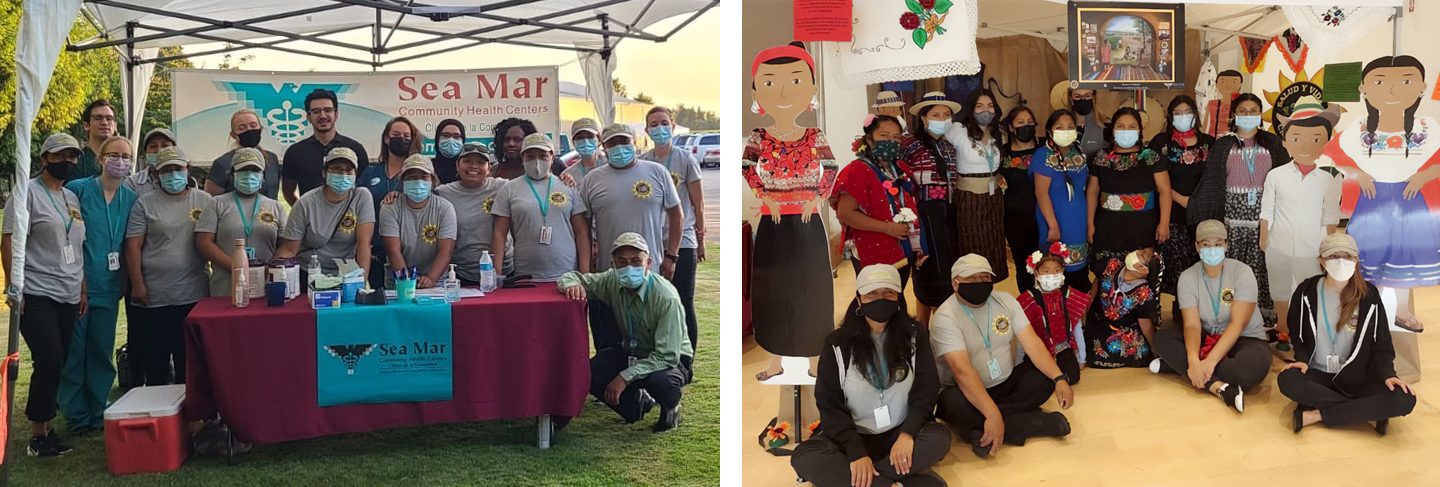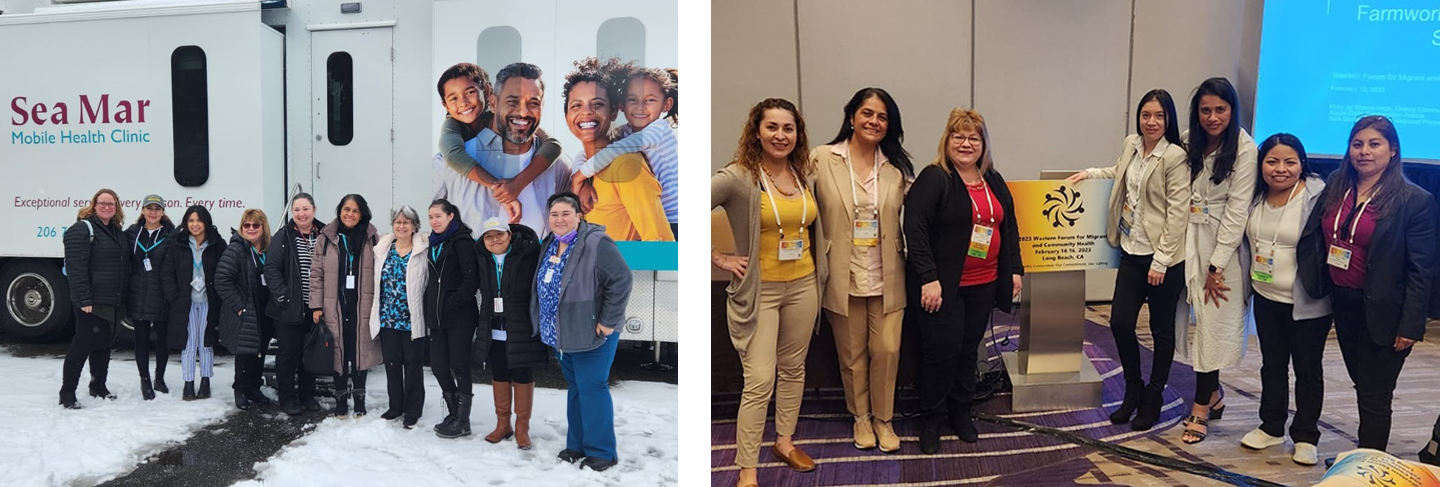
What we do:
We bring linguistically and culturally appropriate health care services and health information to the farmworker community. The type of services and information varies throughout the year to ensure we meet the needs of both those who migrate annually and those who live here year round.
• During high migrant season - mobile medical and mobile dental clinics at farms, farmworker camps and housing sites, and summer health fairs in which community agencies gather to provide culturally appropriate information and services.
• During off-peak season- culturally-appropriate workshops, presentations and events to farms, housing sites and gathering spaces on critical health topics, ranging from diabetes prevention and TB to understanding the US health system and the importance of annual check-ups. New topics are being added regularly.
Serving as a bridge between the community and health services, we try to be responsive to the needs of the farmworker and the farm owner. Each year may differ but this is our general programmatic focus.
We bring linguistically and culturally appropriate health care services and health information to the farmworker community. The type of services and information varies throughout the year to ensure we meet the needs of both those who migrate annually and those who live here year round.
• During high migrant season - mobile medical and mobile dental clinics at farms, farmworker camps and housing sites, and summer health fairs in which community agencies gather to provide culturally appropriate information and services.
• During off-peak season- culturally-appropriate workshops, presentations and events to farms, housing sites and gathering spaces on critical health topics, ranging from diabetes prevention and TB to understanding the US health system and the importance of annual check-ups. New topics are being added regularly.
Serving as a bridge between the community and health services, we try to be responsive to the needs of the farmworker and the farm owner. Each year may differ but this is our general programmatic focus.

Why this program exists
As a Migrant Health Center, Sea Mar works to ensure farmworkers have access to health care and health information. Farmworkers face many barriers to health care in general ranging from long work hours, lack of transportation, work hazards, and migratory status. However, the uniqueness of our farmworkers creates even greater challenges. The majority of our almost 30,000 farmworkers in Skagit and Whatcom are from Mexico, with a high proportion (60-80%) being indigenous from the rural southern states of Oaxaca and Guerrero, and Guatemala. In Skagit, the majority of our indigenous speak Mixtec and Triqui languages. In Whatcom, the majority are Mixtec and at least five different Guatemalan cultural communities (Aguacateco, Mam, Chalchiteco, Ixl, and Canjoval). We continue to uncover new communities regularly so this is just a snapshot. We know some workers also speak additional indigenous Mexican languages: Nahuatl, Zapotec, Purepecha, Quiche. Non-indigenous languages spoken by our farmworkers include Punjabi, Nepali, Russian, Samoan, Vietnamese and Burmese.
Our indigenous farmworkers and their families face the typical barriers confronting all farmworkers, but their linguistic isolation, cultural perspectives on health and wellness, low literacy (even in Spanish), lack of any preventive health experience, and natural mistrust of outsiders presents additional challenges. To ensure our farmworkers have access to culturally and linguistically appropriate health services and information, Sea Mar has indigenous-speaking staff in the clinics and recruits indigenous-speaking promotores de salud (health promotors) who come from these same communities. By reaching out and listening to their needs, as well as continuing to identify and learn about these communities, Sea Mar's Migrant and Seasonal Farmworker Promotores Program is invested in building trust in these communities and continually looks for ways to better serve their needs.
As a Migrant Health Center, Sea Mar works to ensure farmworkers have access to health care and health information. Farmworkers face many barriers to health care in general ranging from long work hours, lack of transportation, work hazards, and migratory status. However, the uniqueness of our farmworkers creates even greater challenges. The majority of our almost 30,000 farmworkers in Skagit and Whatcom are from Mexico, with a high proportion (60-80%) being indigenous from the rural southern states of Oaxaca and Guerrero, and Guatemala. In Skagit, the majority of our indigenous speak Mixtec and Triqui languages. In Whatcom, the majority are Mixtec and at least five different Guatemalan cultural communities (Aguacateco, Mam, Chalchiteco, Ixl, and Canjoval). We continue to uncover new communities regularly so this is just a snapshot. We know some workers also speak additional indigenous Mexican languages: Nahuatl, Zapotec, Purepecha, Quiche. Non-indigenous languages spoken by our farmworkers include Punjabi, Nepali, Russian, Samoan, Vietnamese and Burmese.
Our indigenous farmworkers and their families face the typical barriers confronting all farmworkers, but their linguistic isolation, cultural perspectives on health and wellness, low literacy (even in Spanish), lack of any preventive health experience, and natural mistrust of outsiders presents additional challenges. To ensure our farmworkers have access to culturally and linguistically appropriate health services and information, Sea Mar has indigenous-speaking staff in the clinics and recruits indigenous-speaking promotores de salud (health promotors) who come from these same communities. By reaching out and listening to their needs, as well as continuing to identify and learn about these communities, Sea Mar's Migrant and Seasonal Farmworker Promotores Program is invested in building trust in these communities and continually looks for ways to better serve their needs.
The primary goal of this research was to develop a comprehensive document and share cultural background, worldview, barriers, needs, and opportunities to improve health outcomes for the farmworker community living and working locally. Build bridges of knowledge for local organizations and agencies to adjust and/or create tools and systems that help them deliver services effectively, reaching this specific community in a culturally appropriate manner.
Copyright ©2010-2025: Sea Mar Community Health Centers

